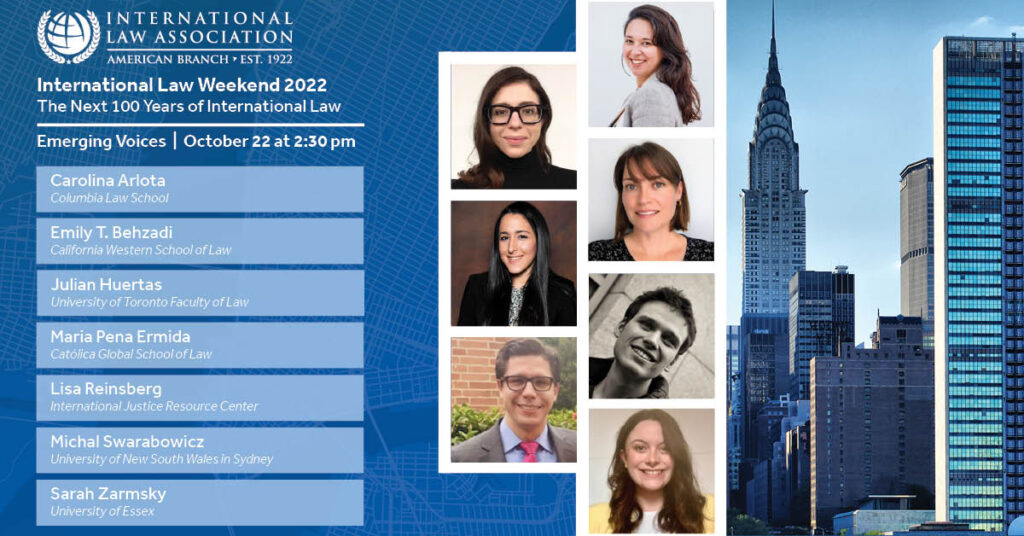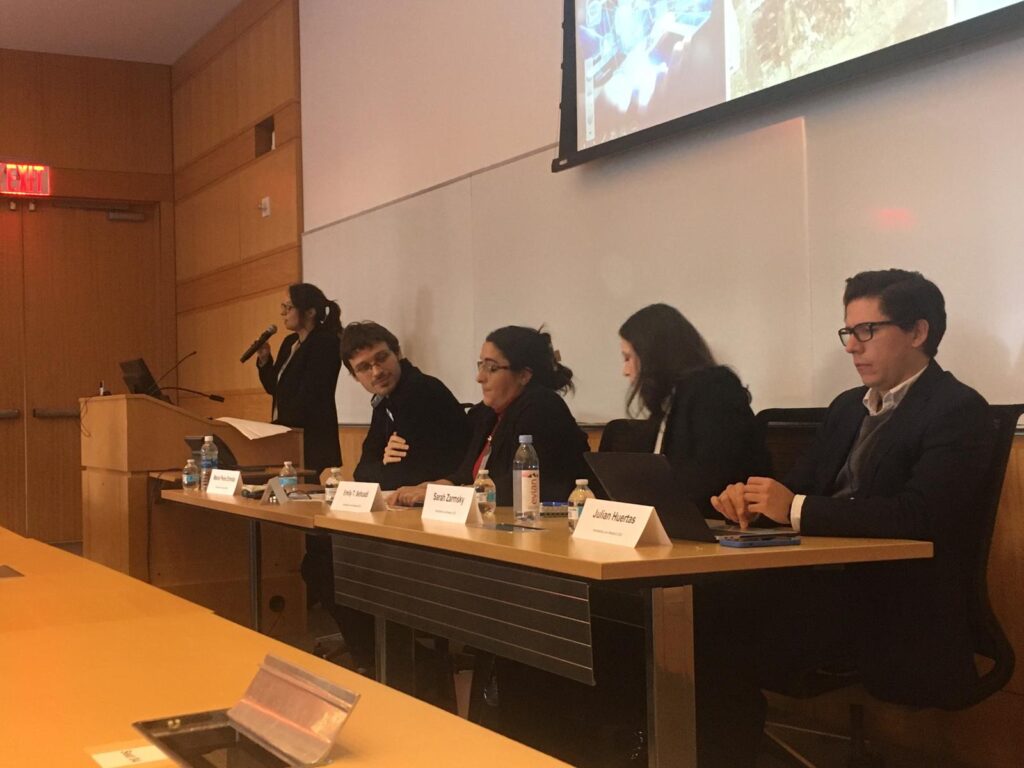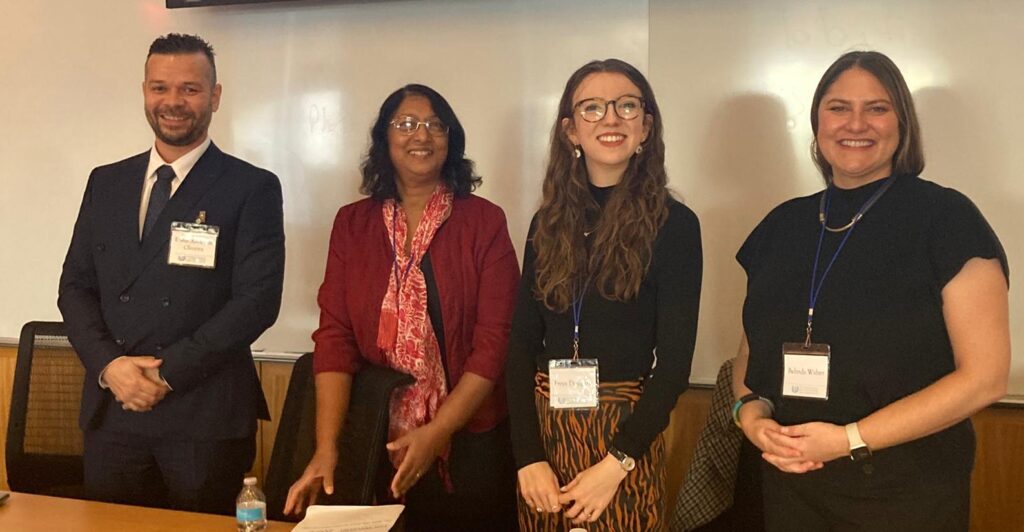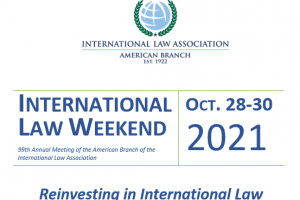The Next 100 Years of International Law: Emerging Voices Panel and Early Career Research
By ABILA 2022 Student Ambassador Freya Doughty, Washington University in St. Louis School of Law, J.S.D. Candidate
The American Branch of the International Law Association is uniquely positioned as the “preeminent international non-governmental organization involved in developing and restating international law.” The various committees of the American Branch are incredibly accomplished and widely published international lawyers and international legal academics. It would therefore be easy to limit presenting opportunities to only those with the most experience of international law – especially when there is a pattern making entering the international legal arena inaccessible – but the American Branch’s International Law Weekend 2022 was the very opposite. Between its ‘Emerging Voices’ panel and the inclusion of early career researchers across several panels, to the free tickets for students, and ‘Pathways to Employment in International Law’ session, International Law Weekend 2022 was a welcome rare event in which participants did not have to face financial hardships to engage with the Branch’s expertise.
Carolina Arlota of the American Branch Committee on International Environmental and Energy Law and Lisa Reinsberg chaired the inaugural Emerging Voices panel, providing a platform for five early career researchers: Associate Professor Emily T. Behzadi of California Western School of Law, PhD Candidate Julian Huertas of the University of Toronto, PhD Candidate and Researcher Maria Pena Ermida of Católica Global School of Law, Postdoctoral Fellow Michal Swarabowicz of the University of New South Wales in Sydney, and PhD Candidate and Assistant Lecturer Sarah Zarmsky of the University of Essex. This blog piece will highlight the work of Huertas, Ermida, and Zarmsky.

Maria Pena Ermida’s focus was on ‘A Horizontal Approach to the Protection of Global Commons.’ She questioned the Westphalian narrative that pervades international law; surely global shifts and issues (war, COVID-19, and even the use of cell phones) means a change is required. Relying upon a “pre-UN Charter conception of sovereignty” is outdated at best and dangerous at worst. The International Criminal Court’s Office of the Prosecutor concurs: there is a need to “move beyond our traditional notions of Westphalia […] i.e., jurisdiction solely rooted in a 17th century concept of sovereign territory.” Using the Westphalian state system fails us when we act beyond the territory of states in ways that impact other states. Ermida suggested taking inspiration from the United Nations Convention on the Law of the Sea to provide an alternative as it is one of the few complete documents that has the universal approach of recognizing that international law cannot be limited to just states. UNCLOS has also been offered as a jurisdictional tool for the territory of cyberspace, a matter far removed from the original drafters of the Peace of Westphalia.

Emerging Voices panelists. International Law Weekend 2022, New York.
Julian Huertas’ presentation concerned ‘International Human Rights Law and the Challenge of Authoritarian Judicial Reasoning.’ He asked whether an authoritarian interpretation of international human rights law could ever seriously challenge the status quo. Unsurprisingly, respect for international human rights law is posited as something central to a liberal democracy. Principal elements of democracy, such as freedom of speech, present a source of tension within an authoritarian regime. Whilst rights like these seem inalienable, could limitation clauses be attached to make certain rights appear more amenable to a regime so diametrically opposed to liberal change? Offering this as an option may be wholly optimistic, and Huertas made it clear this is unlikely to “combat autocratic populism.” However, given “the significant number of brutal, oppressive rules around the world,” seeking alternatives to authoritarian rule is crucial.
Sarah Zarmsky discussed ‘The Inclusion of New Harms in International Criminal Law: A Case Study of Online Harm.” International Criminal Law often does not provide clear interpretations of harm – the primary example is ‘physical or mental harm’ without offering clarification as to what this means or how best to interpret this term. Zarmsky specifically examined mental, emotional, and reputational harm, including the online harm aspect. The international community is ill prepared to deal with online harm, for example the mass surveillance of the Muslim population post 9/11, and it is therefore difficult to achieve justice for the victims of online harm.
Incorporating online harm within international criminal law is desperately required for a myriad of issues, including, but not limited to: the sharing of footage of crimes online, done so by armed groups to spread propaganda and further the harm done to victims and their families; and online sexual abuse, including revenge porn. Zarmsky offered a potential solution by incorporating online harm within preexisting international crimes, or the developing of a new criminal instrument altogether to effectively provide justice for the many present and future victims of online harm.
The Emerging Voices Panel was a captivating look in to the work of international law’s future scholars and practitioners. From utilizing the United Nations Convention on the Law of the Sea as inspiration for a new attitude towards state defined politics, to questioning how one may inject human rights in to authoritarian regimes, and the difficulties attached to legislating the relatively new but incredibly damaging crime of online harm, the panel demonstrated the vast breadth of international legal research. Every issue presented was pertinent and thought provoking – in providing these early career researchers a platform, the American Branch has shown the patent benefits of making international law events more accessible and inclusionary.

Freya Doughty, second from the right. International Law Weekend 2022, New York.




